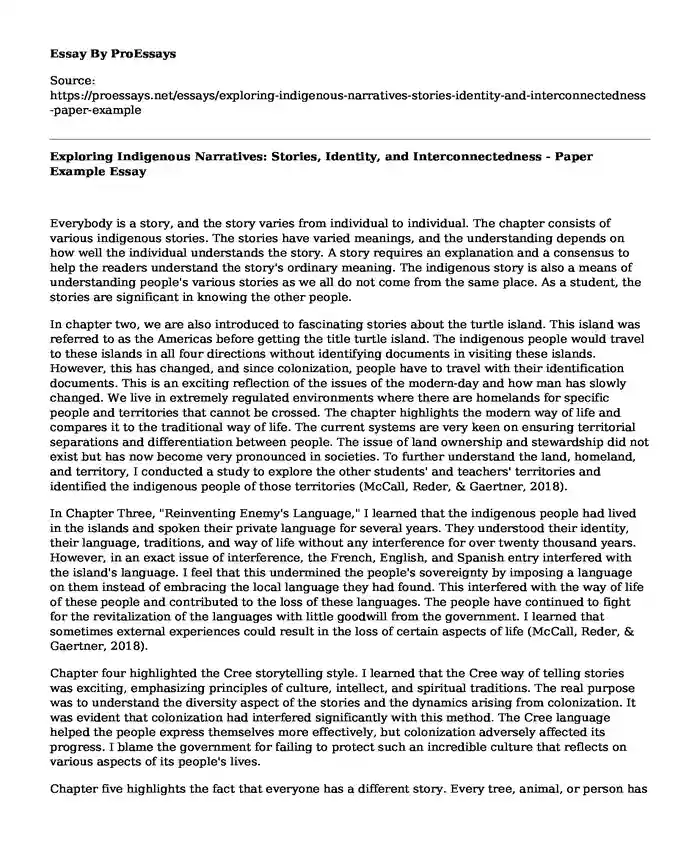Everybody is a story, and the story varies from individual to individual. The chapter consists of various indigenous stories. The stories have varied meanings, and the understanding depends on how well the individual understands the story. A story requires an explanation and a consensus to help the readers understand the story's ordinary meaning. The indigenous story is also a means of understanding people's various stories as we all do not come from the same place. As a student, the stories are significant in knowing the other people.
In chapter two, we are also introduced to fascinating stories about the turtle island. This island was referred to as the Americas before getting the title turtle island. The indigenous people would travel to these islands in all four directions without identifying documents in visiting these islands. However, this has changed, and since colonization, people have to travel with their identification documents. This is an exciting reflection of the issues of the modern-day and how man has slowly changed. We live in extremely regulated environments where there are homelands for specific people and territories that cannot be crossed. The chapter highlights the modern way of life and compares it to the traditional way of life. The current systems are very keen on ensuring territorial separations and differentiation between people. The issue of land ownership and stewardship did not exist but has now become very pronounced in societies. To further understand the land, homeland, and territory, I conducted a study to explore the other students' and teachers' territories and identified the indigenous people of those territories (McCall, Reder, & Gaertner, 2018).
In Chapter Three, "Reinventing Enemy's Language," I learned that the indigenous people had lived in the islands and spoken their private language for several years. They understood their identity, their language, traditions, and way of life without any interference for over twenty thousand years. However, in an exact issue of interference, the French, English, and Spanish entry interfered with the island's language. I feel that this undermined the people's sovereignty by imposing a language on them instead of embracing the local language they had found. This interfered with the way of life of these people and contributed to the loss of these languages. The people have continued to fight for the revitalization of the languages with little goodwill from the government. I learned that sometimes external experiences could result in the loss of certain aspects of life (McCall, Reder, & Gaertner, 2018).
Chapter four highlighted the Cree storytelling style. I learned that the Cree way of telling stories was exciting, emphasizing principles of culture, intellect, and spiritual traditions. The real purpose was to understand the diversity aspect of the stories and the dynamics arising from colonization. It was evident that colonization had interfered significantly with this method. The Cree language helped the people express themselves more effectively, but colonization adversely affected its progress. I blame the government for failing to protect such an incredible culture that reflects on various aspects of its people's lives.
Chapter five highlights the fact that everyone has a different story. Every tree, animal, or person has a different story and this is dictated by their way of life, origin, and experiences. I discovered, however, that despite these differences, the stories are interlinked in a way. The indigenous stories are connected in a way. They highlight similar experiences among the people who lost their property, language, culture, and way of life with colonization. To understand this well, I asked my friends to share stories of their lives and dedicated to the fact they were different but interconnected.
Chapter six explores relationships between individuals. I studied my relationship with others and how this relationship has influenced me to fit into the wider world. These stories study the character and personality of an individual. For example, when I relate with my friends, I try to be respectful as these are principles that influence the relationship. Self is a principle that is affected by responsibilities to other human beings towards ensuring peaceful living. The ability to keep friends and other relationships is dependent on the success of this relationship (McCall, Reder, & Gaertner, 2018).
In chapter seven, I learned that positionality on historical injustices to the indigenous people is critical in understanding the changes. A comparison between the transitions from Turtle Island twenty years ago and the current situation can be attributed to the colonizers' influence. Their arrival caused widespread devastation to the people, which interfered with the way of life of the people. From this, I learned that sometimes outsiders can be disruptive to people's way of life, especially when they only care for their self-interests (McCall, Reder, & Gaertner, 2018).
However, in chapter eight, I learned that genre fiction and fantasy could be used in indigenizing literature. As more stories are done, it would also be essential to focus on the indigenous period, significantly and how it changed today's society.
Reference
McCall, S., Reder, D., & Gaertner , D. (2018). Read. Listen. Tell. Wilfrid Laurier Press.
Cite this page
Exploring Indigenous Narratives: Stories, Identity, and Interconnectedness - Paper Example. (2024, Jan 26). Retrieved from https://proessays.net/essays/exploring-indigenous-narratives-stories-identity-and-interconnectedness-paper-example
If you are the original author of this essay and no longer wish to have it published on the ProEssays website, please click below to request its removal:
- Coming of Age in Mississippi
- The Statue that Hugh Wolf Carves in Rebecca Davis's Life in the Iron Mills
- Text Analysis of Walt Whitman's "Song of Myself" Essay
- Michael Radford's "1984" and George Orwell's "Nineteen Eighty-Four" Essay
- Essay Sample on Love & Obedience in 1984: Winston & Julia's Rebellion Against the Party
- Essay Sample on Fear & Pride: Jack's Conquest in Lord of the Flies
- Free Report Sample: Romanticism/Transcendentalism Questions







